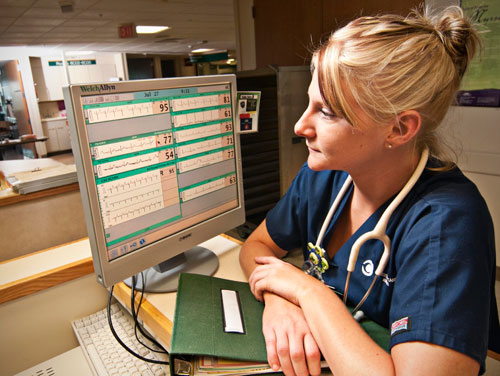New stepdown unit enhances care for stroke patients


A new unit at Christiana Hospital offers highly specialized stepdown care for hospital patients requiring more frequent monitoring, such as stroke patients and those who have had neurointerventional procedures. The term “stepdown” indicates an intermediate level of care between an intensive care unit and a normally staffed inpatient unit.
“Christiana Care has more than1,000 stroke patients a year, sixth highest among U.S. health systems,” said Anthony E. Munson, M.D., medical director, Stroke Program. “We believe the 6C stepdown unit is a significant step forward in enhancing the quality of care.”
The stepdown unit is part of the Stroke Treatment and Rehabilitation (STAR) unit. Launched July 2, the unit provides care for patients with stroke and nontraumatic hemorrhages, as well as interventional procedures such as carotid stents or coiling—a minimally invasive endovascular procedure performed to treat a cerebral aneurysm.
All nurses in the 24-bed unit have had advanced cardiac life support (ACLS) training, plus special training to monitor stroke patients. The nurses assess patients at least once every four hours.
“Neuro assessment is a key component in monitoring the process of stroke patients,” said Teresa Zack, MSN, RN, NE-BC, nurse manager of the STAR unit.
The care team watches for subtle warning signs that might include sudden confusion or a change in the level of weakness on one side.
“In the stepdown unit, we cohort patients in a setting where a nurse can pick up more readily on those minute changes and alert the doctor right away,” Zack said.
Mary Ciechanowski, an advanced practice nurse in the Stroke Program, said the extra level of vigilance should result in fewer complications for patients. Ultimately, that will make care more efficient and could reduce length of stay, allowing patients to return home sooner.